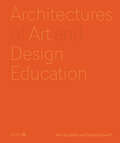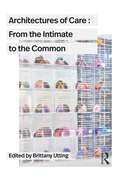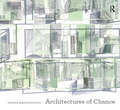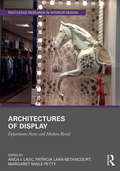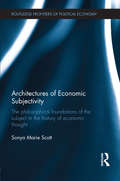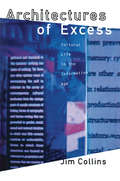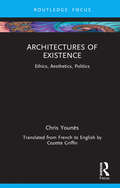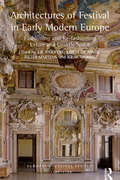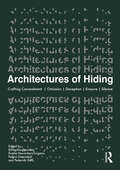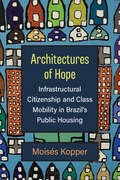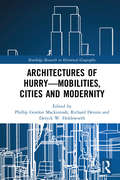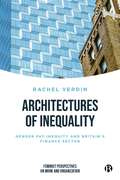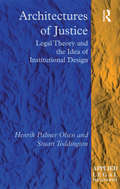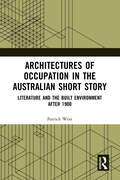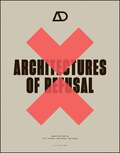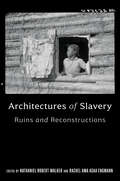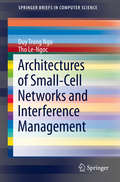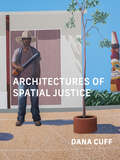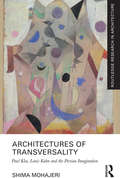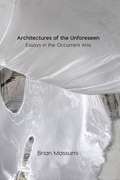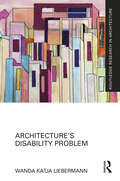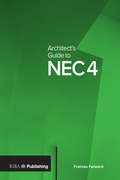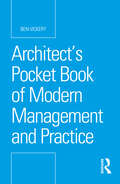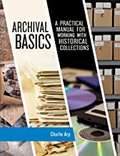- Table View
- List View
Architectures of Art and Design Education: An exploration of UK and international design schools
by Neil Drabble Rose GridneffThe art school has had a fundamental effect on society internationally, influencing how the creative arts are represented and perceived. At a time that funding in the UK is placing arts education in crisis, this is the first book of its kind to investigate the concept of the 'art school' and its social impact and legacy. It highlights how the physical studios and workshops, designed for learning, teaching and making, influence and interact with the curriculum, creativity and practice. Beautifully illustrated, with both archival and contemporary photographs, many taken by the authors, this book celebrates the spaces dedicated to learning and teaching creative disciplines. Exploring a drastically shifting landscape in higher education, it celebrates the crucial relationship between the creative working spaces and the development of creative minds. A timely reflection on the current social and political climate, this book emphasises the significant role that the art school has to play in society, developing thriving creative industries and a wider culture of the arts.Featured art schools include: Chelsea College of Arts Government College of Art, Chandigarh The Bauhaus Escuelas Nacionales de Arte (ENA), Cuba Manchester School of Art.
Architectures of Care: From the Intimate to the Common
by Brittany UttingDrawing from a diverse range of interdisciplinary voices, this book explores how spaces of care shape our affective, material, and social forms, from the most intimate scale of the body to our planetary commons. Typical definitions of care center around the maintenance of a livable life, encompassing everything from shelter and welfare to health and safety. Architecture plays a fundamental role in these definitions, inscribed in institutional archetypes such as the home, the hospital, the school, and the nursery. However, these spaces often structure modes of care that prescribe gender roles, bodily norms, and labor practices. How can architecture instead engage with an expanded definition of care that questions such roles and norms, producing more hybrid entanglements between our bodies, our collective lives, and our environments? Chapters in this book explore issues ranging from disabled domesticities and nursing, unbuilding whiteness in the built environment, practices and pedagogies of environmental care, and the solidarity networks within ‘The Cloud’. Case studies include Floating University Berlin, commoning initiatives by the Black Panther party, and hospitals for the United Mine Workers of America, among many other sites and scales of care. Exploring architecture through the lenses of gender studies, labor theory, environmental justice, and the medical humanities, this book will engage students and academics from a wide range of disciplines.
Architectures of Care: From the Intimate to the Common
by Brittany UttingDrawing from a diverse range of interdisciplinary voices, this book explores how spaces of care shape our affective, material, and social forms, from the most intimate scale of the body to our planetary commons.Typical definitions of care center around the maintenance of a livable life, encompassing everything from shelter and welfare to health and safety. Architecture plays a fundamental role in these definitions, inscribed in institutional archetypes such as the home, the hospital, the school, and the nursery. However, these spaces often structure modes of care that prescribe gender roles, bodily norms, and labor practices. How can architecture instead engage with an expanded definition of care that questions such roles and norms, producing more hybrid entanglements between our bodies, our collective lives, and our environments? Chapters in this book explore issues ranging from disabled domesticities and nursing, unbuilding whiteness in the built environment, practices and pedagogies of environmental care, and the solidarity networks within ‘The Cloud’. Case studies include Floating University Berlin, commoning initiatives by the Black Panther party, and hospitals for the United Mine Workers of America, among many other sites and scales of care.Exploring architecture through the lenses of gender studies, labor theory, environmental justice, and the medical humanities, this book will engage students and academics from a wide range of disciplines.
Architectures of Chance (Design Research in Architecture)
by Yeoryia ManolopoulouArchitectural discourse and practice are dominated by a false dichotomy between design and chance, and governed by the belief that the architect’s role is to defend against the indeterminate. In Architectures of Chance Yeoryia Manolopoulou challenges this position, arguing for the need to develop a more creative understanding of chance as aesthetic experience and critical method, and as a design practice in its own right. Examining the role of experimental chance across film, psychoanalysis, philosophy, fine art and performance, this is the first book to comprehensively discuss the idea of chance in architecture and bring a rich array of innovative practices of chance to the attention of architects. Wide-ranging and through a symbiotic interplay of drawing and text, Architectures of Chance makes illuminating reading for those interested in the process and experience of design, and the poetics and ethics of chance and space in the overlapping fields of architecture and the aleatoric arts.
Architectures of Display: Department Stores and Modern Retail (Routledge Research in Interior Design)
by Anca I. Lasc Patricia Lara-Betancourt Margaret Maile PettyThrough an international range of case studies from the 1870s to the present, this volume analyzes strategies of display in department stores and modern retail spaces. Established scholars and emerging researchers working within a range of disciplinary contexts and historiographical traditions shed light on what constitutes modern retail and the ways in which interior designers, architects, and artists have built or transformed their practice in response to the commercial context.
Architectures of Economic Subjectivity: The Philosophical Foundations of the Subject in the History of Economic Thought (Routledge Frontiers of Political Economy)
by Sonya ScottThe history of European economic thought has long been written by those seeking to prove or disprove the truth-value of the theories they describe. This work takes a different approach. It explores the philosophical groundwork of the theoretical structure within which economic subjects are presented. Demonstrating how the subjects of economic texts tend to be defined in and through their relationship to knowledge, this study addresses the epistemological constitution of subjectivity in economic thought.
Architectures of Excess: Cultural Life in the Information Age
by Jim CollinsFirst Published in 1995. Much of recent theory has characterized life in media-sophisticated societies in terms of a semiotic overload which, allegedly, has had only devastating effects on communication and subjectivity. In Architectures of Excess, Jim Collins argues that, while the rate of technological change has indeed accelerated, so has the rate of absorption. The seemingly endless array of information has generated not chaos but different structures and strategies, which harness that excess by turning it into forms of art and entertainment. Digital sampling in rap music and cyber-punk science fiction are well-known examples of techno-pop textuality, but Collins concentrates on other contemporaneous phenomena that are also envisioning new cultural landscapes by accessing that array--hyper-self-reflexivity in mall movies, best sellers, and prime-time television; the deconstructive vs. new-classical debate in architecture; the emergence of the "New Black Aesthetic;" the development of retro-modernism in interior design and the fashion industries. The analyses of these disparate, discontinous attempts to develop a meaningful sense of location, in an historical as well as a spatial sense, address a cluster of interconnected questions: How is the array of information being "domesticated?" How has appropriationism evolved from the Pop-Art of the sixties to the sampling of the nineties? How has the relationship between tradition, innovation, and evaluation been altered? Architectures of Excess investigates how these phenomena reflect change in taste and subjectivity, considering how we must account for both, pedagogically.
Architectures of Existence: Ethics, Aesthetics, Politics
by Chris YounèsArchitectures of Existence proposes that philosophical thinking (ecosophical thinking) can inform the way we engage with our world and its inhabitants, as architects, designers and planners, but also as individuals, as people, and as a society. In Art et existence, Maldiney states: "For us, to inhabit is to exist". This book aims to unfold, extend, articulate and thicken this postulate by interweaving architecture, city, landscape, literature and philosophy. It takes up the synergistic lines of long-term research carried out from an ecosophical perspective. Such an attitude explores an art of existing in multiplicity, singularity and openness, manifesting the critical dimension through a reinterpretation of the knotting of the trajectories of time, humanity and its becoming. Insisting on what is between things and beings as well as on what is happening, regenerating, recycling, reviving, saving, diversifying, sparing, recreating, meditating: and so caring. These are all eco-rhythms of a different type between human and non-human, to consider ourselves in the world. In an era of uncertainty and climate threats, this book develops the margins of possibility offered by the subject of architecture. This book will be of interest to researchers and students of architecture, urban planning and philosophy.
Architectures of Festival in Early Modern Europe: Fashioning and Re-fashioning Urban and Courtly Space (European Festival Studies: 1450-1700)
by Krista De Jonge J. R. Mulryne R.L.M. Morris Pieter MartensThis fourth volume in the European Festival Studies, 1450–1700 series breaks with precedent in stemming from a joint conference (Venice, 2013) between the Society for European Festivals Research and the PALATIUM project supported by the European Science Foundation. The volume draws on up-to-date research by a Europe-wide group of academic scholars and museum and gallery curators to provide a unique, intellectually-stimulating and beautifully-illustrated account of temporary architecture created for festivals of the sixteenth and seventeenth centuries, together with permanent architecture pressed into service for festival occasions across major European locations including Italian, French, Austrian, Scottish and German. Appealing and vigorous in style, the essays look towards classical sources while evoking political and practical circumstances and intellectual concerns – from re-shaping and re-conceptualizing early sixteenth-century Rome, through providing for the well-being and political allegiance of Medici-era Florentines and exploring the teasing aesthetics of performance at Versailles to accommodating players and spectators in seventeenth-century Paris and at royal and ducal events for the Habsburg, French and English crowns. The volume is unique in its field in the diversity of its topics and the range of its scholarship and fascinating in its account of the intellectual and political life of Early Modern Europe.
Architectures of Hiding: Crafting Concealment | Omission | Deception | Erasure | Silence
by Federica Goffi Rana Abughannam Émélie Desrochers-Turgeon Pallavi SwaranjaliArchitecture manifests as a space of concealment and unconcealment, lethe and alêtheia, enclosure and disclosure, where its making and agency are both hidden and revealed. With an urgency to amplify narratives that are overlooked, silenced and unacknowledged in and by architectural spaces, histories and theories, this book contends the need for a critical study of hiding in the context of architectural processes. It urges the understanding of inherent opportunities, power structures and covert strategies, whether socio-cultural, geo-political, environmental or economic, as they are related to their hidescapes – the constructed landscapes of our built environments participating in the architectures of hiding. Looking at and beyond the intentions and agency that architects possess, architectural spaces lend themselves as apparatuses for various forms of hiding and un(hiding). The examples explored in this book and the creative works presented in the interviews enclosed in the interludes of this publication cover a broad range of geographic and cultural contexts, discursively disclosing hidden aspects of architectural meaning. The book investigates the imaginative intrigue of concealing and revealing in design processes, along with moral responsibilities and ethical dilemmas inherent in crafting concealment through the making and reception of architecture.
Architectures of Hope: Infrastructural Citizenship and Class Mobility in Brazil's Public Housing
by Moisés KopperArchitectures of Hope examines how communal idealism, electoral politics, and low-income consumer markets made first-time homeownership a reality for millions of low-income Brazilians over the last ten years. Drawing on a five-year-long ethnography among city planners, architects, street-level bureaucrats, politicians, market and bank representatives, community leaders, and past, present, and future beneficiaries, Moisés Kopper tells the story of how a group of grassroots housing activists rose from oblivion to build a model community. He explores the strategies set forth by housing activists as they waited and hoped for—and eventually secured—homeownership through Minha Casa Minha Vida’s public-private infrastructure. By showing how these efforts coalesced in Porto Alegre—Brazil’s once progressive hotspot—he interrogates the value systems and novel arrangements of power and market that underlie the country’s post-neoliberal project of modern and inclusive development. By chronicling the making and remaking of material hope in the aftermath of Minha Casa Minha Vida, Architectures of Hope reopens the future as a powerful venue for ethnographic inquiry and urban development.
Architectures of Hurry—Mobilities, Cities and Modernity (Routledge Research in Historical Geography)
by Richard Dennis Phillip Gordon Mackintosh Deryck W. Holdsworth‘Hurry’ is an intrinsic component of modernity. It exists not only in tandem with modern constructions of mobility, speed, rhythm, and time–space compression, but also with infrastructures, technologies, practices, and emotions associated with the experience of the ‘mobilizing modern’. ‘Hurry’ is not simply speed. It may result in congestion, slowing-down, or inaction in the face of over-stimulus. Speeding-up is often competitive: faster traffic on better roads made it harder for pedestrians to cross, or for horse-drawn vehicles and cyclists to share the carriageway with motorized vehicles. Focusing on the cultural and material manifestations of ‘hurry’, the book’s contributors analyse the complexities, tensions, and contradictions inherent in the impulse to higher rates of circulation in modernizing cities. The collection includes, but also goes beyond, accounts of new forms of mobility (bicycles, buses, underground trains) and infrastructure (street layouts and surfaces, business exchanges, and hotels) to show how modernity’s ‘architectures of hurry’ have been experienced, represented, and practised since the mid nineteenth century. Ten case studies explore different expressions of ‘hurry’ across cities and urban regions in Asia, Europe, and North and South America, and substantial introductory and concluding chapters situate ‘hurry’ in the wider context of modernity and mobility studies and reflect on the future of ‘hurry’ in an ever-accelerating world. This diverse collection will be relevant to researchers, scholars, and practitioners in the fields of planning, cultural and historical geography, urban history, and urban sociology.
Architectures of Inequality: Gender Pay Inequity and Britain’s Finance Sector (Feminist Perspectives on Work and Organization)
by Rachel VerdinAvailable open access digitally under CC-BY-NC-ND licence.The gender pay gap is economically irrational and yet stubbornly persistent. Focusing on the UK finance industry which is known for its gender pay disparity, this book explores the initiatives to fix gendered inequities in the workplace. Rachel Verdin crafts a unique framework, weaving extensive organizational data with women's lived experiences. Interviews uncover gaps in pay transparency, obstacles hindering workplace policies and the factors that are stalling progress for the future. This is an invaluable resource that offers key insights into gender equality and EDI measures shaped by legal regulations as well as corporate-driven initiatives.
Architectures of Justice: Legal Theory and the Idea of Institutional Design (Applied Legal Philosophy)
by Henrik Palmer Olsen Stuart ToddingtonLaw can be seen to consist not only of rules and decisions, but also of a framework of institutions providing a structure that forms the conditions of its workable existence and acceptance. In this book Olsen and Toddington conduct a philosophical exploration and critique of these conditions: what they are and how they shape our understanding of what constitutes a legal system and the role of justice within it.
Architectures of Occupation in the Australian Short Story: Literature and the Built Environment after 1900
by Patrick WestPatrick West’s Architectures of Occupation in the Australian Short Story cultivates the potential for literary representations of architectural space to contribute to the development of a contemporary politics of Australian post-colonialism.West argues that the predominance of tropes of place within cultural and critical expressions of Australian post-colonialism should be re-balanced through attention to spatial strategies of anti-colonial power. To elaborate the raw material of such strategies, West develops interdisciplinary close readings of keynote stories within three female-authored, pan-twentieth century, Australian short-story collections: Bush Studies by Barbara Baynton (1902); Kiss on the Lips and Other Stories by Katharine Susannah Prichard (1932); and White Turtle: A Collection of Short Stories by Merlinda Bobis (1999). The capacity of the short-story form to prompt creative and politically germinal engagements with species of space associated with architecture and buildings is underscored. Relatedly, West argues that the recent resurgence of binary thought—on local, national, and international scales—occasions an approach to the short-story collections shaped by binary relationships like a dichotomy of inside and outside. Concluding his argument, West connects the literary and architectural critiques of the story collections to the wicked problem, linked to ongoing colonial violences, of improving Australian Indigenous housing outcomes.Innovative and interdisciplinary, this book will be of interest to scholars and students of Literary, Architectural, and Postcolonial Studies. .
Architectures of Refusal (Architectural Design)
by Jill Stoner Ozayr SaloojeeGuest-edited by Jill Stoner and Ozayr Saloojee Over the past decade, and in a more concentrated form over the past two years, there has been increasing recognition of architecture’s systemic complicity in constructing and upholding hierarchies of race and class, and privileging colonial paradigms that perpetuate spatial and economic inequity. This AD issue reveals how designers, practitioners, scholars and architects are participating in dismantling the major canons of Western architecture. The work is both literal and figural: taking buildings apart and reconstituting them, and challenging mythologies that include drawing-as-analogue, building-as object, architect-as-hero and nature-as-other. Architecture has both potential and responsibility for political agency in the public realm. The contributions to this issue foreground emancipatory spatial ideas and practices from around the world, demonstrating that refusal is no longer just absence and denial, but a constructive mode of resistance and action that needs to be approached through subversive urban works, design pedagogy and alliances across multiple disciplines. Contributors: Piper Bernbaum, Carwil Bjork-James, Thiresh Govender, Lucia Jalón Oyarzun, Jennifer Newsom and Tom Carruthers, Cong Chi Nguyen, Quilian Riano, Hannah Le Roux, Alberto de Salvatierra, Cathy Smith, Chat Travieso, and Ilze Wolff.
Architectures of Slavery: Ruins and Reconstructions (Race, Place, and Justice)
by Nathaniel Robert Walker Rachel Ama Asaa EngmannThe material legacies of slavery across the Atlantic world Atlantic slavery has bequeathed architectural legacies from the plantation ruins that fill the valleys of Cuba to the servant&’s quarters of middle-class apartment housing in Brazil; from picturesque New England waterfronts to the modernist ranch-house suburbs of Savannah; and from the castle-studded coastline of Ghana to steel-framed commercial high-rises in South Carolina. The stories of these places are woven together by historical threads stretched across the past five hundred years, connecting them first through empire and forced migration, then by modern economic development and heritage tourism. Architectures of Slavery brings new clarity and critical insight to these visible injustices that still haunt so many societies in the Atlantic world, empowering its people to build more democratic and just places in the future.
Architectures of Small-Cell Networks and Interference Management (SpringerBriefs in Computer Science)
by Tho Le-Ngoc Duy Trong NgoThis Springer Brief presents the architectures of small-cell networks and recent advances in interference management. The key challenges and values of small cells are first introduced, followed by the reviews of various small-cell architectures and interference management techniques in both heterogeneous CDMA and heterogeneous OFDMA small-cell networks. New adaptive power control and dynamic spectrum access techniques are discussed to promote a harmonized coexistence of diverse network entities in both 3G and 4G small-cell networks. Analytically devised from optimization and game theories, autonomous solutions are shown to effectively manage the intra-tier and cross-tier interferences in small cells. Informative and practical, this Springer Brief is designed for researchers and professionals working in networking and resource management. The content is also valuable for advanced-level students interested in network communications and power allocation.
Architectures of Spatial Justice
by Dana CuffA field-defining work that demonstrates how architects are breaking with professional conventions to advance spatial justice and design more equitable buildings and cities.As state violence, the pandemic, and environmental collapse have exposed systemic inequities, architects and urbanists have been pushed to confront how their actions contribute to racism and climate crisis—and how they can effect change. Establishing an ethics of spatial justice to lead architecture forward, Dana Cuff shows why the discipline requires critical examination—in relation to not only buildings and the capital required to realize them but privilege, power, aesthetics, and sociality. That is, it requires a reevaluation of architecture&’s fundamental tenets.Organized around projects and topics, Architectures of Spatial Justice is a compelling blend of theory, history, and applied practice that focuses on two foundational conditions of architecture: its relation to the public and its dependence on capital. The book draws on studies of architectural projects from around the world, with instructive case studies from Chile, Mexico, Japan, and the United States that focus in particular on urban centers, where architecture is most directly engaged with social justice issues.Emerging from more than two decades of the author&’s own project-based research, Architectures of Spatial Justice examines ethically driven practices that break with professional conventions to correct long-standing inequities in the built environment, uncovering architecture&’s limits—and its potential.
Architectures of Transversality: Paul Klee, Louis Kahn and the Persian Imagination (Routledge Research in Architecture)
by Shima MohajeriArchitectures of Transversality investigates the relationship between modernity, space, power, and culture in Iran. Focusing on Paul Klee’s Persian-inspired miniature series and Louis Kahn’s unbuilt blueprint for a democratic public space in Tehran, it traces the architectonics of the present as a way of moving beyond universalist and nationalist accounts of modernism. Transversality is a form of spatial production and practice that addresses the three important questions of the self, objects, and power. Using Deleuzian and Heideggerian theory, the book introduces the practices of Klee and Kahn as transversal spatial responses to the dialectical tension between existential and political territories and, in doing so, situates the history of the silent, unrepresented and the unbuilt – constructed from the works of Klee and Kahn – as a possible solution to the crisis of modernity and identity-based politics in Iran.
Architectures of the Unforeseen: Essays in the Occurrent Arts
by Brian MassumiA beautifully written study of three pioneering artists, entwining their work and our understanding of creativity Bringing the creative process of three contemporary artists into conversation, Architectures of the Unforeseen stages an encounter between philosophy and art and design. Its gorgeous prose invites the reader to think along with Brian Massumi as he thoroughly embodies the work of these artists, walking the line that separates theory from art and providing equally nurturing sustenance for practicing artists and working philosophers.Based on Massumi&’s lengthy—and in two cases decades-long—relationships with digital architect Greg Lynn, interactive media artist Rafael-Lozano Hemmer, and mixed-media installation creator Simryn Gill, Architectures of the Unforeseen delves into their processes of creating art. The book&’s primary interest is in what motivates each artist&’s practice—the generative knots that inspire creativity—and in how their pieces work to give off their unique effects. More than a series of profiles or critical pieces, Massumi&’s essays are creative, developing new philosophical concepts and offering rigorous sentiments about art and creativity.Asking fundamental questions about nature, culture, and the emergence of the new, Architectures of the Unforeseen is important original research on artists that are pioneers in their field. Equally valuable to the everyday reader and those engaged in scholarly work, it is destined to become an important book not only for the fields of digital architecture, interactive media, and installation art, but also more basically for our knowledge of art and creativity.
Architecture’s Disability Problem (Routledge Research in Architecture)
by Wanda Katja LiebermannArchitecture’s Disability Problem explores the intersection of architecture and disability in the United States from the perspective of professional practice. This book uncovers why, despite the profound effect of the Americans with Disabilities Act on the architectural profession, there has been so little interest in design for disability in mainstream architecture. To counter this, the book investigates alternative approaches to designing with disability, through three case studies. These showcase both buildings and how design processes driven by disabled people shape design and professional roles.Combining historical research, formal and discourse analysis, and interviews with people who design, construct, use buildings, and advocate for access, the book develops a social understanding of how the buildings work at functional, affective, and symbolic levels. Architecture’s Disability Problem is aimed at three primary readers: practicing architects, architectural scholars, and members of disability scholar-activist communities. Grounded in detailed design studies, the author hopes to unearth the social meaning-making of architecture related to disability. Ultimately, the book makes an argument for a focus on disability in its own right—as well as on the body—in place of the dominance of formal, object-oriented approaches.This book presents and argues for a fundamental shift in the way architectural education, policy, and practice views and engages with disability. It will be key reading for students, researchers, practitioners and policy-makers.
Architect’s Guide to NEC4
by Frances ForwardThis user friendly guide introduces, explains, and demystifies the NEC4 contract on a practical, work-based level. Made for architects by an architect, it explores the best approach to collaborative and contractual partnering work practices. Alongside explanations of the contracts and clauses, it presents the key areas of distinction from alternative standard form contracts and examines the integrated project management principles that bring the NEC4 contracts together as a whole. It's the perfect companion book for professionals who are new to the NEC contract family and former users trying to understand the latest updates.
Architect’s Pocket Book of Modern Management and Practice (Routledge Pocket Books)
by Ben VickeryThis book is an easily digestible guide to the management and practice knowledge needed to establish and run an architectural practice. It is of particular interest to those starting out in the profession and to students, whilst also being useful to architects more widely who need succinct information to assist them in the daily management of their work. The book sits beside the Architect’s Legal Pocket Book providing legal information and the Architect’s Pocket Book providing guidance in design. It covers all the main management and practice topics relevant to the running of an architectural business including setting up the company, the profession, project management, fees, office management, financial management and teamwork. It also looks at the state of the construction industry and the architectural profession today, new forms of practice, and how the profession is changing. The book is interweaved with pearls of wisdom and experience and reflections from architects, bringing the topics to life and aiding the reader’s understanding.
Archival Basics: A Practical Manual For Working With Historical Collections (American Association For State And Local History Ser.)
by Charlie ArpArchival Basics for Historic Record Collections is an introduction to the concepts, policies, infrastructure and tasks needed to collect, preserve and make archival collections available to researchers. The book is based on content presented in workshops by the Council of State Archivists and presented in an on-line course by the American Association of State and Local History since 2003. Arp focuses on the discreet tasks necessary to manage archival collections. This is a practical, how-to book on managing archival collections designed for those who have responsibility for such collections but lack formal archival training.
